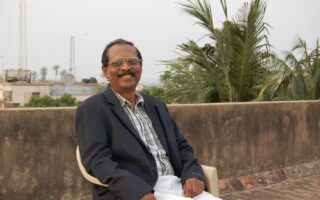“If I am what I am, it is nothing unique. This is how a normal human being is supposed to be.”

Dr. Christodas Gandhi, IAS (Retd.) is a true follower of our Great Leader Babasaheb Dr. B.R. Ambedkar. During his tenure as an Administrator, he did an excellent awakening service in ameliorating the poor SC/ST’s more particularly the entrepreneurial youths and budding youngsters.
He has held several portfolios, including that of Additional Chief Secretary/ Development Commissioner, Planning and Development Department; Collector of Erode District; and Chairman and Managing Director of Tamil Nadu Energy Development Agency.
In an exclusive interview, Dr. Christodas Gandhi IAS tells Marie Banu about his passion for the scheduled caste communities.
A senior IAS officer, you have been known as a very honest and simple person. Who is your role model?
My father, Thiru. M. Ramdas (Retd. Superintendent of Police), Vallalar, Valluvar, and my wife Tmt. Qudsia Begum influenced my simplicity, while being majestic. For my father’s stature, he could have admitted his children in any big convent. But, three of us studied in Trichy Seva Sangam School, an institution run for orphans. We had fantastic teachers and teaching was under thatched roof in the company of a peer group that consisted of all sections of people. My wife, Qudsia, gave me all practical lessons of Islamic equity. Humility in high stature is what I imbibed from these personalities.
My father taught me how to treat all people equal. He taught us what needed to be taught; not academics, but human values and human rights. My wife taught me how to treat servants as family members. My intense interaction with schedule caste communities and other deprived communities, and human rights NGOs might have also taught me how to be upright and establish people’s rights. I owe my thanks to them.
If I am what I am, it is nothing unique. This is how a normal human being is supposed to be. Abnormalities only need special acculturation.
Can you please share a memorable incident during your tenure as Collector of Erode District with our readers?
During my tenure as Collector of Erode District, there was an issue related to land allocation for construction of 60 group houses for the scheduled caste families in Chennimalai. When I visited the selected site, I found the land to be low-lying and situated near a lake, whereas 10 acres of poromboake land was available in an elevated area in the adjoining location. I realized that the local caste forces did not want the scheduled caste community members to be allocated a place that is of higher worth. I insisted that the elevated land be allocated for construction and returned to office.
The very next day, all the 60 beneficiaries visited my office and requested me to allow them construct their homes in the low-lying land.
I stood firm in my decision, and told the beneficiaries to go in confidence and construct the homes in the allocated piece of land. Now, they have constructed their homes and are living better lives here.
Being a socially conscious person, what are the issues that you are concerned of?
I am concerned about the schedule caste communities. I feel that the only social problem that hinders growth, creates discriminating attitude in the community, and leads to violence is—the discrimination shown against schedule castes. The others are only matters of differences, like for instance, between a man and a woman; disabled and normal; and elderly and young – for which there are sympathetic takers.
If our country learns to provision equity to SC/STs, then we will know how to deal with other social problems. Else, we will only be indulging in slurry of table-dressing for any other social issues.
Constitutionally, discrimination has been abolished. But, bureaucracy needs to do more proactive deeds and enforce constitutional mandates. Even officers belonging to the scheduled caste are afraid of taking up this issue as they feel weak and fear of being victimized. This is a challenging subject for any bureaucrat.
The Tribal communities have been living a hard way of life over the years. When do you see their lives progressing?
Since 1996, I have been visiting remote tribal places in Tamil Nadu that were far away from civilization. They lived a self-contained and dignified life; a life of their own. What they lost was education, which was one of the reasons why they were pushed behind.
Tribals are peace loving and confident people. They are the most hospitable people and not hostile to anyone. The introduction of Forest Act and other forest regulations have totally alienated tribals from their homesteads and their free lifestyle. This forced bondage over them for over a century without caring for their livelihood had caused severe problems. 70,000 to 1 lakh acres of land need to be restored to tribals under the Scheduled Tribes Forest Rights Act 2006.
However, I am happy to find tremendous change and prosperity coming into their life in the last ten years or so. What they need more is self-determination and autonomy of growth. I am confident that tribals in Tamil Nadu will become the richest in the neighbourhoods in the near future. Irulars have a special place in my heart.